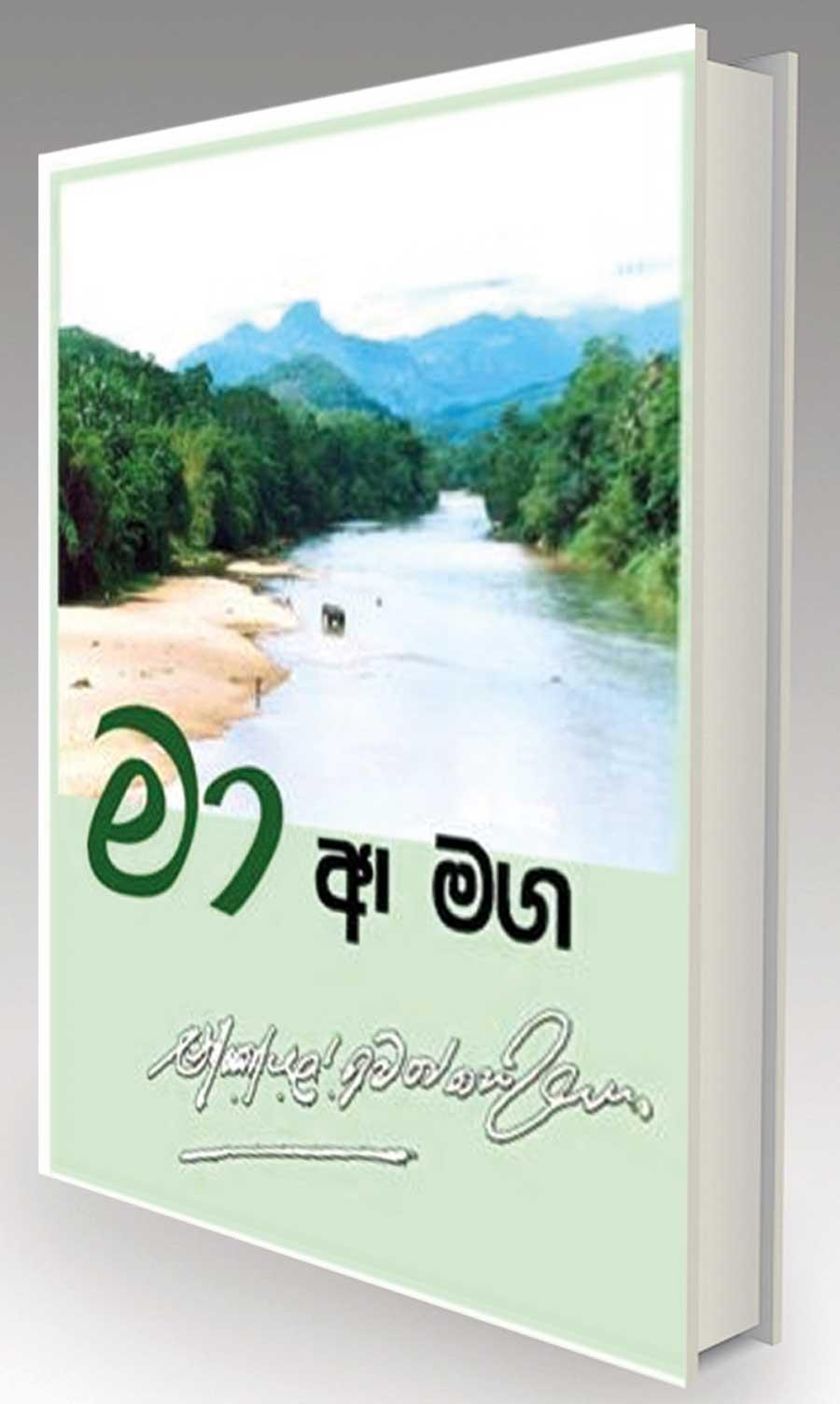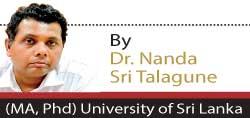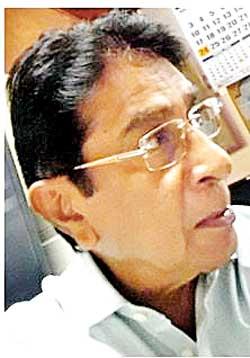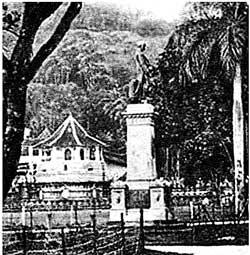21 Feb 2019 - {{hitsCtrl.values.hits}}

 Ma-Aa-Maga (The Path I Came), is a recollection of memories of a versatile personality in Sri Lanka’s newspaperdom. It is none other than Kumar Wethasinghe, who earned an unblemished career record at Lake House (ANCL), and at Wijeya Newspapers with over thirty-five years of service.
Ma-Aa-Maga (The Path I Came), is a recollection of memories of a versatile personality in Sri Lanka’s newspaperdom. It is none other than Kumar Wethasinghe, who earned an unblemished career record at Lake House (ANCL), and at Wijeya Newspapers with over thirty-five years of service.
Fondly and popularly known to his friends as Kumar and to some as Wette, who earlier wrote and published profiles of eminent personalities viz Anagarika Dharmapala, D.S. Senanayake, President J.R. Jayawardene and Mahatma Gandhi, has now resolved to pen down his own biography titled as Ma-Aa-Maga.
Prof. Ajantha Hapuarachchi, who herself was a journalist by profession before she became a full-time academic at the Journalism Unit of the University of Colombo, comments in her foreword that Ma-Aa-Maga as a sociological review/account of Sri Lanka’s post-independence era, which Kumar presents lucidly and remarkably inspiring the present and future generations with the Buddhist heritage, in which he was brought up and which he cherishes to date.
Kumar, using his journalistic writing skills presents this interesting account which revolves around the family he hails from and disseminates his first-hand experience to share with the present and future generations about the bygone era, that has undergone a socio, cultural, political and economic transformation.
While associating with Professor Ajantha, I notice something beyond a sociological review in Ma-Aa-Maga.
It is a revelation about his personal life that Kumar has disclosed to the new generations. I call it a revelation about his personal life because he openly shares it with the readers.
His childhood, youth and up to date appears to be a chain of interesting events which he recollects in this book.
When browsing through the pages of Ma-Aa-Maga the foremost inspiration one gets is that his life binding his ancestry originated from the Sitawaka to the hill country of Sri Lanka.
 He refers to his century-old ancestral home Chandrakuti, Padiyapelalla, as Maha Gedara, which is situated 160 km from Colombo, in a beautiful hamlet, along the Nuwara Eliya road (via Ragala).
He refers to his century-old ancestral home Chandrakuti, Padiyapelalla, as Maha Gedara, which is situated 160 km from Colombo, in a beautiful hamlet, along the Nuwara Eliya road (via Ragala).
At its page 25, I noticed a fascinating personality which he very lovingly relates as his loving aunt, whom he identifies as ‘Mal Nanda’ and whose name, in fact, was Florence.
Under her care, Kumar grew up in his early childhood.
Thus, he seems to still occupy a special place for his Aunty Florie, whom no doubt should have shaped and influenced his adolescences. This is evident from the space (eleven pages from page 25 to 36) he dedicates for his loving Aunt. In fact, Kumar published the nursery rhymes, she taught as a bilingual book titled Kiddies Smiles.
Yet another remarkable aspect of his personal life is his acquaintance with eminent political personalities over the past fifty years in Sri Lanka, particularly President J.R. Jayawardene, the first Executive President. The biography of J.R. Jayawardene, Kumar published as ‘Podu Jana Agametindu’ in 1977.
The President’s correspondence with him annexed at the end of the book bears testimony to his acquaintance with him as a political confidante.
Besides, his Janatha Vinishchya (People’s Judgement), woven around the life and times of the Father of the Nation with historical anecdotes of Sri Lanka from 1505 - 1952 shows his deep interest in politics as a youth.
He not only organized various campaigns including protests but also took part in them as well.
The paper clipping of the Ceylon Daily News dated November 27th in 1961, also caught my eye which carries a news article as “Stop Press Grab”.
“……… a resolution was passed calling on the then Prime Minister to withdraw the Press Bill at a meeting of the Kandy Heladiva Arakshaka Sishya Peramuna, held to commemorate Weera Keppetipola, presided over by Mr. N.K.L.Wethasinghe, the leader of the Peramuna simultaneously passing another resolution demanding the then Minister of Cultural Affairs to “Remove the Statue of Governor Henry Ward” from the place where it was as “Mr Wethasinghe pointed out that it was a dishonour to Keppetipola Maha Disawe, the great hero who sacrificed his life for the sake of national independence”.
This clipping suffices to prove how he had been engrossed with political developments taking place in the country while still a student at Dharmaraja College, Kandy. Perhaps, due to this dynamic personality which he possessed at adolescence, he missed the opportunity of completing higher studies at the Ceylon Law College.
Influence of Mahatma Gandhi too, as his ideal of how he should contribute to shaping society, is evident from a quotation of Mahatma Gandhi’s at page 57, “An ounce of practice is better than a ton of theory; this saying had made an impact on his future life as a practical person and to identify utopian and socialism. He believes in action instead of words.
He further highlighted Mahatma Gandhi’s philosophy through his bilingual publication Ran Ovadan (Golden Ideologies).
Instead of taking to the legal profession, his interest in photography and journalism took him in a long journey which he would never have thought of, but it was something he was destined to.
 Kumar initially founded his National Photo Service in Kandy in 1968, before joining Lake House as a career Journalist.
Kumar initially founded his National Photo Service in Kandy in 1968, before joining Lake House as a career Journalist.
However, his joining Lake House took him on a remarkable journey spanning over thirty-five years which ended up in reaching the highest position at Lake House, a journalist could have achieved. He did not confine himself to photo-journalism but made use of his inherent writing skills to promote social welfare.
Coming to the conclusion of this interesting book involving the life and times of this veteran journalist, I cannot ignore the paper clipping at page 94, which reports his visit to the 167-year-old newspaper office The Examiner in Tasmania.
Its headline would strike anyone who reads this book Visitor casts an expert eye over The Examiner.
In this news article the reporter Alison Andrew, who now owns and manages her newspaper, The Nation Courier reports:
“…this retired newspaperman has wanted to come to Tasmania where one of Sri Lanka’s pioneer Educationists Henry Woodward, spent his last days. …… the former photographer and journalist had been at various times Associated Newspapers of Ceylon Limited; pictures desk editor, foreign news department and legal affairs editor. He wants to write books in his retirement and perhaps stands for politics, because he wants to take part in the major changes that he believes are needed in his country”.
The major changes since his retirement have been taking place in Sri Lankan politics but the real change that people would look forward to, is yet to happen. I believe still Kumar has time to make a constructive contribution towards that using his inborn talent when many including some notable so-called media men are making destructive contributions for their self-interests.
I asked Kumar, as to why he had not given details of his family which comprises a team of academics, he quipped that President JRJ, once said that he did not want to discuss his son’s horoscope in his absence. Though his comment sounds over-democratic his love and affection to them is amply displayed through pages 97 – 106.
As a colleague at Daily News and friend, I am happy to pen a few lines about his book Ma-Aa-Maga and life experiences which are worth highlighting. He deserves more than these few lines, but the problem of space does not permit to do so. I look forward to seeing an expanded version of this by him on contemporary politics of Sri Lanka.
30 Nov 2024 2 hours ago
30 Nov 2024 3 hours ago
29 Nov 2024 29 Nov 2024
29 Nov 2024 29 Nov 2024
29 Nov 2024 29 Nov 2024